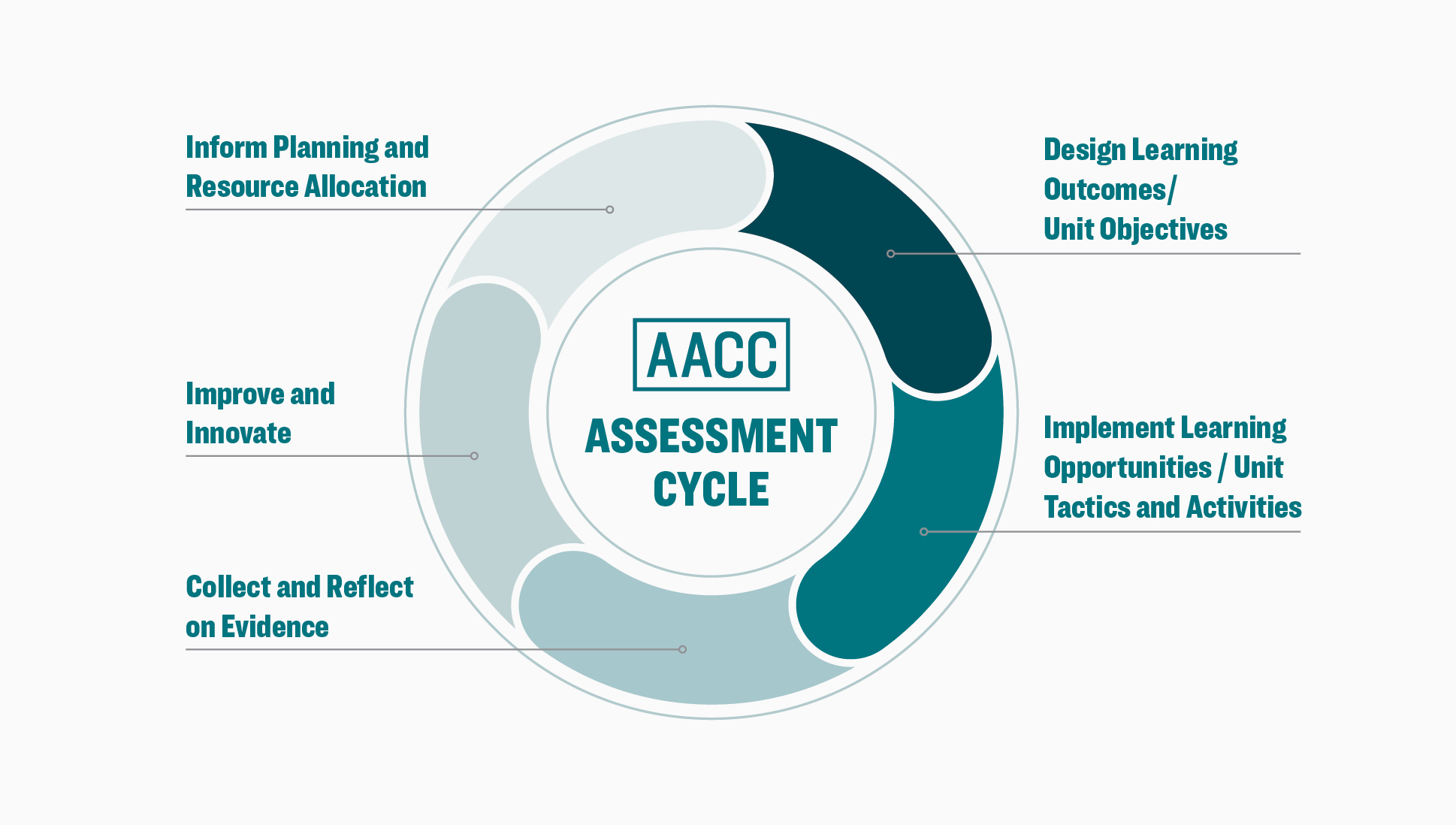Anne Arundel Community College strives to continuously improve the quality of the programs and services provided to the community. The college implements an ongoing and sustainable continuous improvement process that allows faculty and staff to systematically assess student learning outcomes, administrative effectiveness, and achievement of strategic goals and objectives. Aligned and integrated with the college’s Strategic Plan, assessment occurs across academic programs and administrative units. The image below illustrates AACC’s assessment cycle.

MSCHE is the accrediting body for AACC. MSCHE's reaccreditation process requires a comprehensive institutional self-study in all areas, with a clear focus on the assessment of student learning. There are seven standards and 15 requirements by which AACC is evaluated. In addition, MSCHE emphasizes that our team use the most robust, direct measures of assessment possible. The next MSCHE self-study evaluation and site visit is in academic year 2030-2031. PRIA supports the work of AACC’s reaccreditation self-study efforts.
Learn more about accreditation at AACC.
The Institutional Assessment Team (IAT) is a large multidisciplinary group representing all academic and administrative units within the college. Its task is to successfully coordinate assessment at all levels: institutional, program/unit and course. It works to streamline the assessment process and validate assessment methods, improving transparency and data circulation.
The Strategic Planning Committee (SPC) at AACC oversees the planning process as the college decides its major goals and objectives. Included in this is the engagement and assessment of these objectives. In this regard, the SPC oversees the work of the Integrated Assessment Team.
Learn more about AACC’s strategic plan.
PRIA spearheads all other assessment work done on campus, including work related to general education outcomes, learning outcomes assessment (LOA), program review and administrative unit assessment.
We assess students’ proficiency with the core general education areas of reading, writing, quantitative reasoning, scientific reasoning, information and technological fluency. This work is done once every three years.
Contact Audra Butler, Ed.D., for information.
Mission Statement
Anne Arundel Community College offers a high quality, affordable and accessible education in an accredited learning environment. The collegewide learning outcomes assessment system supports this central mission by engaging in continuous improvement for student learning in an innovative atmosphere.
Value Statement
In the Division of Learning, we value assessment that is faculty driven and administratively supported.
Core Values
Student Learning Outcome Assessment Report
Contact Audra Butler, Ed.D., for information.
Comprehensive Program Review:
The collaborative comprehensive program review process at AACC is a reflective and analytical procedure that promotes the continuous improvement and alignment of academic programs. This internal self-evaluation and assessment allows our teams to address academic quality, and to document continuous improvements to external accreditors and stakeholders. This process helps inform decision-making by setting academic priorities and aligning resources to institutional mission and goals. This work is done once every four years.
Academic Departments
Academic departments, including credit and noncredit programs, participate in these reviews. Vice presidents, deans, academic chairs, research analysts and faculty workgroups engage in this systematic, comprehensive and cyclical process to ensure that our programs are meeting students’ educational goals.
Content of Program Reviews
AACC programs, which include degrees and certificates, are examined within the context of the college’s current goals, priorities and resources. Successful academic program reviews typically contain discussions around the following data:
Contact Audra Butler, Ed.D., for information.
As a complement to learning outcomes assessment (LOA) and program review, noninstructional administrative units are also assessed as part of AACC’s assessment cycle. Units are assessed as to the extent to which they are achieving their stated unit objectives in the context of AACC’s strategic plan, most notably in their contribution to student success.
Noninstructional administrative unit assessment addresses quality and efficiency, with a focus on continuous improvement. This process helps inform institutional decision-making by better aligning resources to fulfill institutional mission and goals. All units participate in this assessment process. This work is done every year, with each unit assessing two objectives tied to the goals of our strategic plan at quarterly intervals.
Contact Sarah Gatchel for information.